
Do you have trouble reading English?
Would you like to read English faster, with better comprehension, without looking up words in a dictionary frequently?
If so, this guide is for you.
Here are 7 steps to improving your reading comprehension in English:
Step 1: Read Material That You Actually Enjoy

To improve your reading comprehension, you need to read a lot.
This would be possible only if you read stuff that you find enjoyable, engaging, or interesting.
Examples of good reading material:
- Nonfiction books about topics you like (self-improvement, dating, programming, beauty, health, history).
- Novels in your favorite genres (fantasy, romance, mysteries, adventure).
- Best-selling books. (If a book sells really well, it’s probably good.)
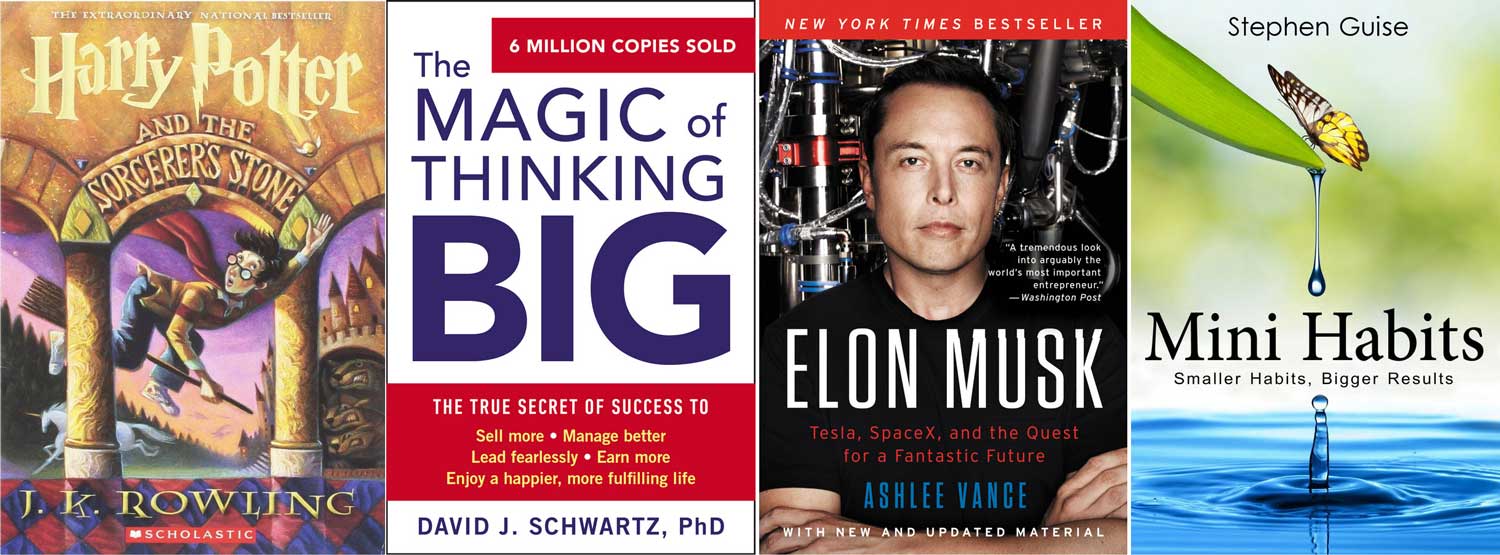
This kind of reading material is good because it grabs your attention and compels you to keep reading.
On the other hand, if what you read is boring, you won’t stick with it for long.
That’s why I don’t recommend English reading apps or online reading exercises because the content is usually bland and boring.
Don’t believe me? Look at this random, boring text from an English reading app:
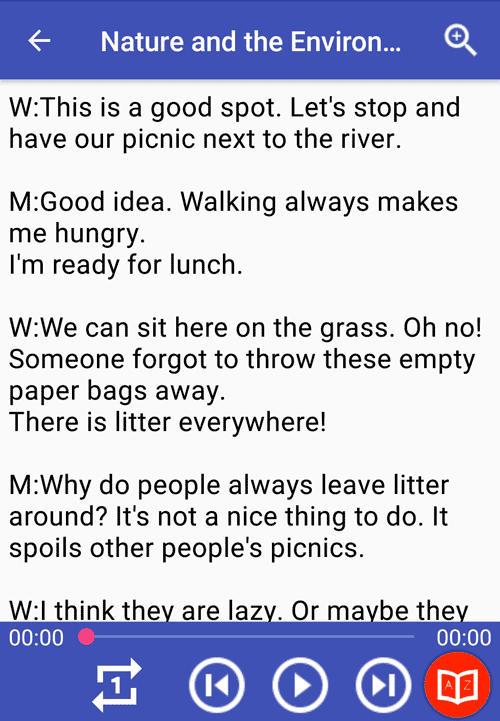
How excited are you to read something like this?
I don’t know about you, but if I used such app to improve my reading, I would quit very soon out of boredom.
If you read something random just for the sake of learning English, reading will feel like a chore. You’ll get bored and read very little. But if you read things that naturally interest you, it will be easier to read a lot.
Step 2: Read Books Instead of Online Articles

When it comes to reading material, you have two main options:
- You can read books (either physical or digital books).
- You can read free articles on the web.
Personally, books are my favorite type of reading material, and I recommend reading books instead of blogs, websites, or other types of reading material.
Sure, reading stuff online is free. But other than that advantage, books are superior to online materials in every way.
Here are the reasons why you should read books.
Quality
Books are usually more well-written than online articles. In many cases, book authors spent years planning, researching, and writing their books.
When you buy a book, you get content that took someone months or years of their life to create (for a low price). That’s incredible!
Online articles, on the other than, usually take a lot less time to write, so the quality isn’t as good.
This is particularly true if you enjoy fiction (novels). Most of the best fictional stories are in books. You’ll be hard-pressed to find great stories for free on the web.
Reading Experience
Most web articles (and reading apps) are filled with distracting elements like advertisements and popups. Which makes the reading experience unpleasant.
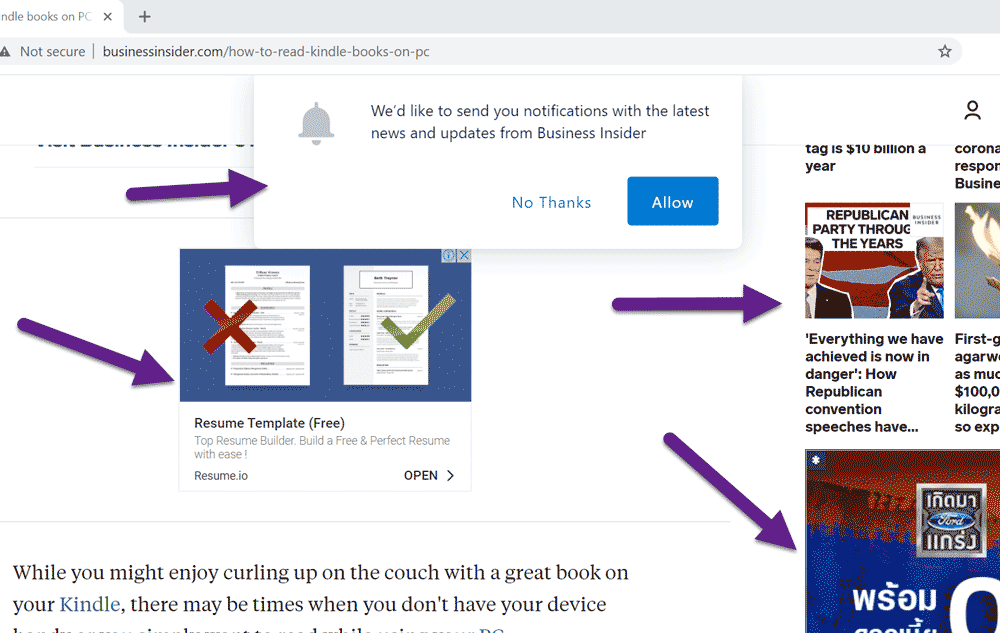
Seriously, how are you supposed to stay focused with all these distractions?
On the contrary, books have no distractions, so it’s easy to stay focused.
When I read a book, I often get immersed in it. And I can read for a long period without much effort.
It’s not so easy with online articles though. I can spend hours reading on the web and never reach the same level of focus and comprehension.
Vocabulary
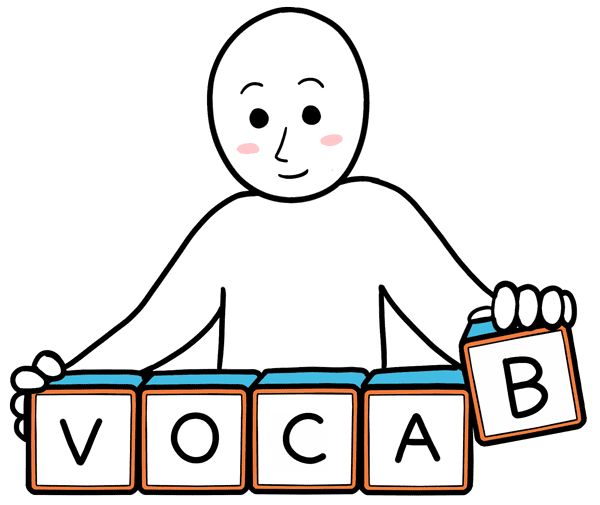
If you want to improve your reading skills, you need to expand your vocabulary.
Which means you need to read material that’s a bit challenging for your current reading level (something that contains plenty of unknown words).
Books are perfect for that. I’ve been reading English books for many years, and I still discover new vocabulary all the time. (In fact, a native English speaker in his 40s once told me he still encountered new words in the books he read quite often.)
However, when I read online, I don’t come across new words very often.
You see, online articles tend to have simpler vocabulary than books. They also have simpler writing style.

This is because most Internet users are impatient and have a short attention span. If they open a web page and see a passage with complex sentences or advanced vocabulary, they’ll close that page in an instant!
Therefore, many bloggers simplify their writing to use mostly basic vocabulary and short sentences to make their content super easy to read. Which means you won’t learn many new words by reading on the Internet (unless you’re a beginner).
In contrast, book readers tend to be more patient and have a longer attention span, so book authors don’t have to worry too much about using simple vocabulary and writing style.
For this reason, books tend to have a richer vocabulary and more advanced writing style. Which is good since it challenges your reading skills.
Even if you’re a newbie who might benefit from the simple language of online content, I still don’t suggest reading them. There are a lot of quality books that are great for beginners. Read those instead. (For example, the first two Harry Potter novels are fun, imaginative, and easy to read.)
What If You Can’t Afford English Books?

English books can be pricey.
For instance, in my country (Thailand), the English version of the first Harry Potter novel is 35% more expensive than the translated version.
So what if you don’t have enough money to buy English books?
Or what if there isn’t an English bookstore near you?
No worries. I have a solution for you.
Read digital books instead of physical books.
You can buy digital books from Amazon, the world’s largest online bookstore.
You don’t need a Kindle (reading device) to read digital books. You can read them with Amazon’s reading app (Kindle app) on your phone.

Unlike physical books, digital books don’t have printing or distribution costs, so they can be priced extremely low.
In fact, on Amazon you’ll find many books that are dirt cheap or free!
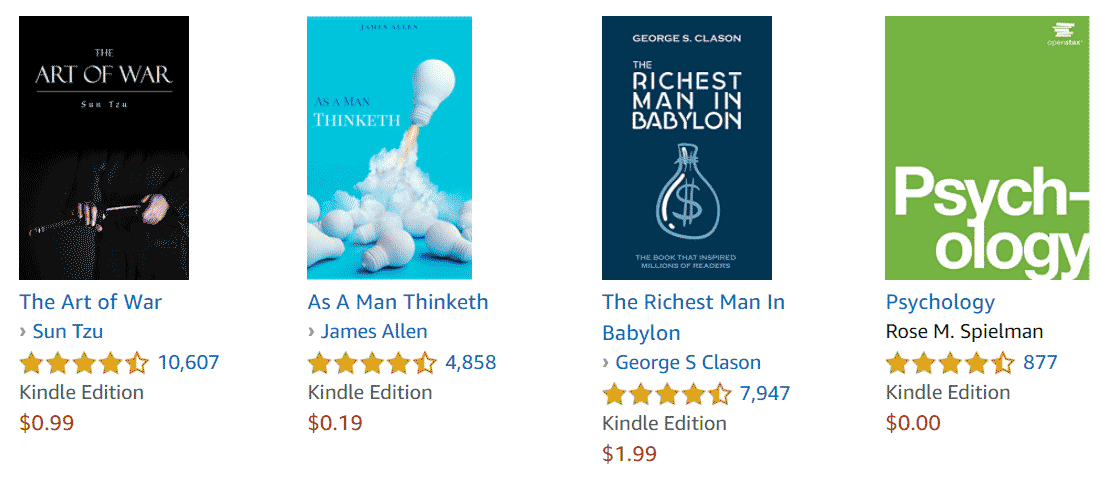
As a long-time Amazon customer, I can tell you there are plenty of good books that are cheaper than $3. If you read three of these books per month, you’ll pay less than $10 per month.
Sure, some digital books are on the expensive side (10 US dollars or more). But if they’re good, I still think they’re worth it considering the value you get from them. (You get to improve your English reading skills while being entertained and/or educated at the same time).
TIP: When browsing on Amazon, if you see an interesting book with a $0 price tag, click the Buy Now button immediately. You’ll pay nothing and the book will be in your account forever. (Even if the author raises the price afterwards, you won’t have to pay anything.)
The cool thing about reading on Amazon’s Kindle app or a Kindle device is the built-in dictionary. If you see a word you don’t know, simply tab on that word and the meaning will appear instantly.
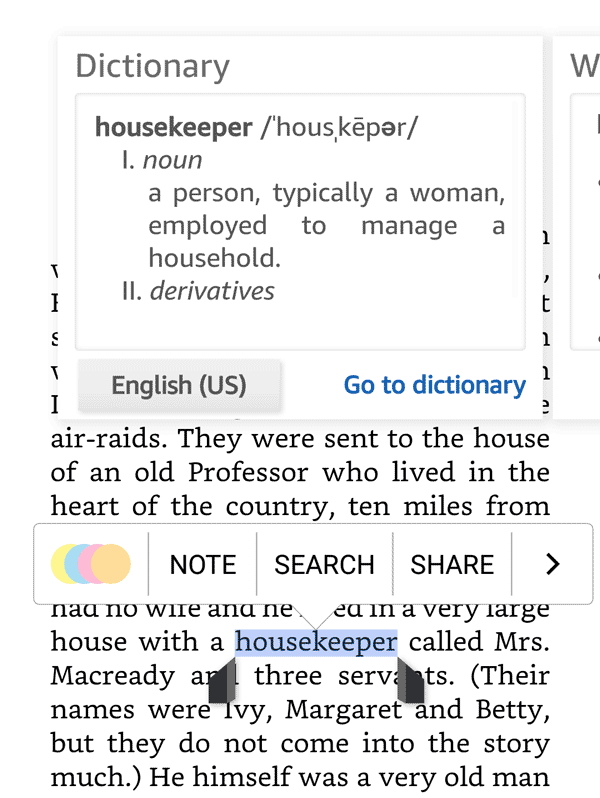
This is so convenient and makes the experience much more enjoyable!
Step 3: Develop the Habit of Reading

After you get yourself a few good books, it’s time to start reading.
Ideally, you should read every day.
The good news is that this is not difficult to do (even if you’re busy).
There’s always an opportunity to read. You can read on public transport, at the doctor’s office, during your lunch breaks, etc.
But you won’t be able to do that unless you have your reading material on hand.
So unless you read on your phone, always carry a book or your reading device (Kindle or tablet) with you. Bring it along wherever you go.
During those odd periods throughout the day, instead of playing mobile games or browsing social media like many people do, pick up your reading material and start reading!
Or if you need a longer period of time to get yourself immersed in a book, you can schedule a specific time for reading, like in the morning or before bed.

I personally use both approaches. I read during little moments throughout the day and also before bed. By doing so, it’s easy for me to read 4 – 7 books every month even though I’m not a fast reader.
Step 4: Replace Reading Your Native Language with Reading English
This is an easy tip to read more English.
Each day, you probably read quite a bit on the web in your first language.
You read posts on Facebook, news stories, forums, etc.
But if you’re going to read something, why not do it in English?
If you follow Facebook pages, YouTube channels, and forums in your native language, replace them with similar pages/channels/forums in English.
For example, let’s say you enjoy learning cooking recipes from Facebook. You might start following cooking pages in English (instead of following pages in your native language).
If you participate in discussion forums, join sites like Reddit or Quora, not sites in your first language.
Or if you’re going to search the Internet for certain information, do it in English.
This will ensure that you’re constantly exposed to English vocabulary.
Step 5: Don’t Fuss Over Reading the Right Way

As you begin your reading journey, you might wonder what is a proper way to read.
Do you have to learn every new word you encounter?
Should you make sure that you understand every sentence?
Or is it okay to skip over a few words or sentences as long as you understand the main idea?
Here’s the answer: just read however you feel like it.
There’s no right or wrong way read. Just do what feels natural to you.
In fact, you can use different reading styles depending on the material (and your mood at the time).
At least that’s what I do. Sometimes I read for the main idea without looking up every new word. I do this when I’m reading something fun (like a novel) and want to enjoy it fully. My goal is to get immersed in the book, so learning vocabulary is not a priority here. (I look up only words that seem important.)
Other times I read more slowly and look up every word I don’t know. I take time to make sure I understand every small detail.
And there have been plenty of times where I left a book unfinished because I’d lost interest.
As you can see, there are no rules you must follow, so don’t overthink it.
Just…read.
Step 6. Use Memory Techniques to Remember Vocabulary Better

There are a few memory techniques you can use to memorize words faster.
If used correctly, it’s possible to memorize a new word forever (without relearning).
I discuss these memory techniques in my guide to memorizing English vocabulary. Feel free to read it if you’re interested.
Whether you should use a memory technique depends on the device you’re reading with. If you mainly read on a Kindle device or Kindle app, it may not be necessary to use these techniques because it’s easy to look up words on the device/app. (Simply tab on the word and the meaning will appear.)
But if you read mostly physical books, and you often have to look up the same words in the dictionary or on the web over and over (because you can’t remember them the first time), then using a memory technique is a great idea.
Step 7: Vary Your Reading Material

Note: this last step is meant for intermediate readers and above. If you’re a beginner, there’s no need to apply this step (yet).
If you’re consistent with your reading, your reading skills will improve steadily regardless of the type of material you read.
However, if you want to improve faster, then you should avoid material that’s too easy (you know most of the vocabulary).
Sure, that might still improve your reading speed, focus, and your ability to extract the main idea, but it won’t increase your vocabulary much.
And since vocabulary is such an important part of language acquisition, you should ensure your reading material is not too easy for you.
The idea is to keep challenging your reading skills.
Here are a few ideas on how to do it:
- If you’ve been reading books for children (with basic vocabulary), switch to reading books for young adults, then books for adults.
- Read books on various topics. Books on the same topic tend to have similar subsets of English vocabulary. Reading new topics is a great way to expose yourself to new sets of vocabulary.
- If you’ve been reading only nonfiction books, give fiction books a try (and vice versa).
Doing so will ensure you’re exposed to a wide variety of vocabulary and writing style, which will greatly enhance your English reading skills.
Thanks for reading. I hope you find this guide useful.
Reading in English is one of the best ways to spend your time.
Other than improving your reading comprehension, reading expands your knowledge, exposes you to new ideas, relieves stress, entertains you, makes you more imaginative, improves your mindset, etc.
Reading in English improves your vocabulary and grammar. Which increases your confidence in your overall English competency. As a result, it becomes easier for you to improve other skills such as your listening or speaking skills.
Have fun reading!

